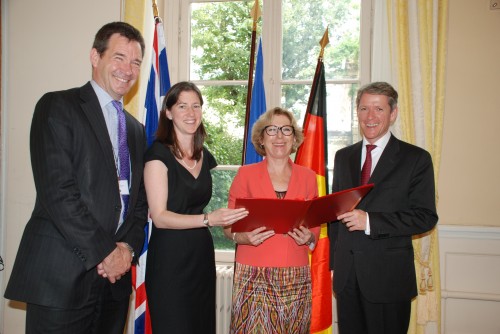
Smiles all around in Paris. From left to right are ILL director-general Andrew Harrison, Hermione Gough of the British Embassy, the French minister for higher education Geneviève Fioraso and Peter Reuss of the German Embassy. (Courtesy: ILL)
By Hamish Johnston
Despite the tough economic conditions in much of Europe, scientists who use one of the continent’s leading scientific facilities have something to smile about. The UK, France and Germany have agreed to continue funding the Institut Laue-Langevin (ILL) neutron facility for at least another decade.
Nestled between the steep slopes of the Isère valley on the outskirts of Grenoble, the ILL is a nuclear reactor that has been producing neutrons for condensed-matter physics, materials science, chemistry and biology for more than 40 years. The facility is also the world leader in the production and study of ultracold neutrons for fundamental physics.
This latest agreement was signed in Paris yesterday by representatives of the three countries that provide the bulk of funding for the facility. Also present was ILL director-general Andrew Harrison, who said “In a period of economic difficulty, this renewed commitment by the governments of our associate countries sends a very strong message of confidence in both the ILL and the neutron-science community to deliver world-leading science, which also impacts more generally on society.”
The ILL’s associate countries are the UK, France and Germany, which each provide about 25% of the ILL’s annual budget. The remaining money comes from the lab’s 12 scientific members: Spain, Switzerland, Austria, Italy, the Czech Republic, Sweden, Hungary, Belgium, Slovakia, Denmark, Poland and India.
The reactor currently supplies neutrons to 40 instruments that are used each year by about 1200 researchers from more than 40 countries. My favourite piece of kit at the ILL is the neutron turbine, which slows down neutrons as they bounce off its rotating blades.
Back in 2011 I spoke to Andrew Harrison about the future of the ILL and you can listen to the interview here.
Pleased with this rather unavoidable decision to fund and run the ILL upto 2023, because it is still the best reseach place with neutrons even after about 40 years of its setting up by a group of German and French scientists.